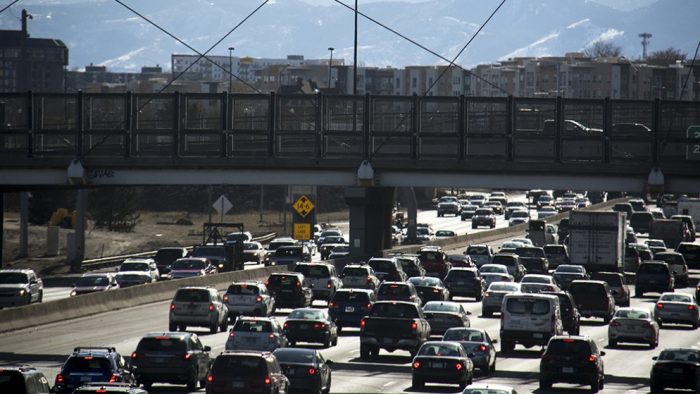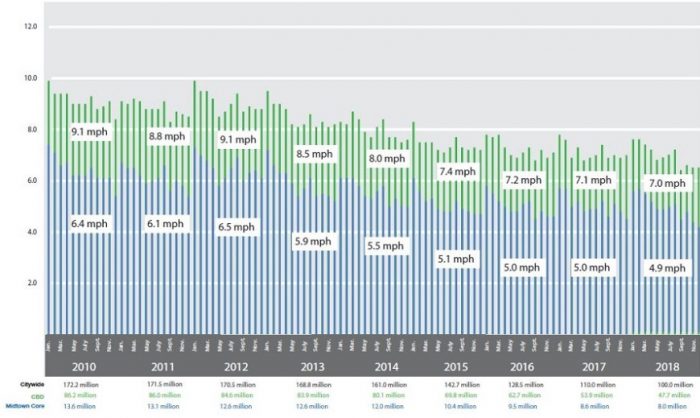Overview
Timely updated knowledge of traffic state and traffic flow parameters is essential for effective traffic control. Because of its simplicity, the Cell Transmission Model (CTM) has been widely used to serve as the underlying traffic flow model based on which a traffic state estimation scheme is built. A prominent feature of CTM is that for a given road cell, CTM switches between two modes: free-flow mode and congestion mode. For each mode, the traffic flow dynamics are linear in traffic density. As a result, most existing traffic state estimators that were derived from CTM switch among two linear working modes, and hence Kalman filter (KF) or ensemble Kalman filter (EnKF) can be applied. These existing estimators have assumed that traffic flow parameters including the free-flow speed and the critical density are known and time-invariant. However, in reality, these traffic flow parameters can be time-varying rather than fixed-valued.
Dr. Zhou and Dr. Ozbay found that, if the traffic flow parameters are time-varying and/or the knowledge of these parameters are biased, the performances of a traffic state estimator that has assumed them to be known and fixed-valued can be significantly downgraded. Moreover, only augmenting these parameters into the state vector and then resorting to nonlinear recursive estimation techniques such as extended Kalman filter (EKF) cannot solve the issue. This is because, under a CTM-based traffic estimator, the critical density is unobservable under free-flow conditions, and hence biased initial knowledge of the critical density can cause false switching of the working model of the estimator and distort the estimation afterward.
Research Objectives & Deliverables
The research objectives of this project are:
- An automatic, residual-based mode switch supervisory observer that requires no prior knowledge of traffic flow parameters
- On-line estimation of capacity-drop-proportion: Integrate the calibration of capacity-drop-proportion value into the real-time traffic state estimation process.
- Modifications of CTM to accommodate speed adaption of bottleneck discharge flow.
- Fusion of measurements from loop detectors and connected vehicles to improve TSE quality.
- Adaptive ramp metering based on the improved TSE method and integrate the improved CTM-EKF estimator with ramp metering control.
The deliverables for this project are:
- Including the computer programs for the developed integrated robust traffic state and parameter estimation and adaptive control algorithm, and the macroscopic and
micro-simulation models in which the algorithm is embedded - One peer-reviewed journal article and two peer-reviewed conference articles
- An advanced short course on applications of modern control and estimation theory to traffic operations and control for NYU transportation graduate students. This course will also integrate part of the content of a postgraduate level short course on modern estimation theory and application taught by Zhou in Queensland University of Technology
- A final report


Personnel
| Principal Investigator | Kaan Ozbay |
| Funding Source | Request from C2SMART: $50,000 Cost share from NYU: $28,527 |
| Total Project Cost | $78,257 |
| USDOT Award # | 69A3551747124 |
| Start and End Dates | 3/01/2020 – 2/28/2021 |
| Implementation of Research Outcomes | The research outcomes will be implemented in a simulated environment. Specifically, the integrated traffic state estimation and traffic control strategy will be coded in MATLAB and tested. Via simulation, we will examine the effectiveness of the proposed strategy against proper base-line strategies. |
| Impacts/Benefits of Implementation | It is expected that, implementation of the proposed strategy should be able to detect changes in traffic flow parameters (i.e. free-flow speed and critical density) automatically, and hence the quality of traffic state estimation, and hence the performance of the traffic controller, will be improved. |






